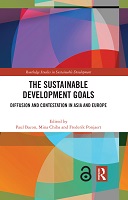Chapter 4 Diffusion of SRHR and local constraints
Proposal review
The Philippines
| dc.contributor.author | Avramovska, Elena | |
| dc.date.accessioned | 2022-11-10T08:44:03Z | |
| dc.date.available | 2022-11-10T08:44:03Z | |
| dc.date.issued | 2023 | |
| dc.identifier.uri | https://library.oapen.org/handle/20.500.12657/59190 | |
| dc.description.abstract | This chapter examines how international accords on sexual and reproductive health, such as the SDGs, were implemented in the context of the Philippines. By looking at the cumbersome struggle to pass The Responsible Parenthood and Reproductive Health Act of 2012 (RH Law), it crystallizes some of the challenges to comprehensively legislate in the domain of sexual and reproductive health. The run-up to the passing of the RH Law shows how the Catholic Church remains a powerful veto player in this policy domain. Looking at the origins of this political clout, the chapter uses the concept of ‘limited statehood’. It illustrates how the Church’s political power originates in the high degree of legitimacy it gained throughout history. Functioning as a competitor organisation to the state, in the provision of goods and services since the formative years of the state and having had a unique role during the democratic transition of the country, the Church enjoyed a strong moral authority. The case study of the RH Law shows how the Church managed to translate this authority into raw political power, which it used to stifle comprehensive legislation in the domain of sexual and reproductive health. | en_US |
| dc.language | English | en_US |
| dc.subject.classification | thema EDItEUR::K Economics, Finance, Business and Management::KJ Business and Management | en_US |
| dc.subject.classification | thema EDItEUR::J Society and Social Sciences::JN Education::JNF Educational strategies and policy | en_US |
| dc.subject.classification | thema EDItEUR::J Society and Social Sciences::JP Politics and government::JPQ Central / national / federal government::JPQB Central / national / federal government policies | en_US |
| dc.subject.classification | thema EDItEUR::R Earth Sciences, Geography, Environment, Planning::RP Regional and area planning | en_US |
| dc.subject.other | education for sustainability, global governance, norms, SDGs, wellbeing discourse | en_US |
| dc.title | Chapter 4 Diffusion of SRHR and local constraints | en_US |
| dc.title.alternative | The Philippines | en_US |
| dc.type | chapter | |
| oapen.identifier.doi | 10.4324/ 9781003205951-6 | en_US |
| oapen.relation.isPublishedBy | 7b3c7b10-5b1e-40b3-860e-c6dd5197f0bb | en_US |
| oapen.relation.isPartOfBook | e2b7c84e-c84c-45df-9f4d-27905e230550 | en_US |
| oapen.relation.isFundedBy | 0c3f9ac7-e87b-4c15-bf78-80ac7812a0bc | en_US |
| oapen.relation.isbn | 9781032072180 | en_US |
| oapen.relation.isbn | 9781032072197 | en_US |
| oapen.imprint | Routledge | en_US |
| oapen.pages | 13 | en_US |
| peerreview.anonymity | Single-anonymised | |
| peerreview.id | bc80075c-96cc-4740-a9f3-a234bc2598f1 | |
| peerreview.open.review | No | |
| peerreview.publish.responsibility | Publisher | |
| peerreview.review.stage | Pre-publication | |
| peerreview.review.type | Proposal | |
| peerreview.reviewer.type | Internal editor | |
| peerreview.reviewer.type | External peer reviewer | |
| peerreview.title | Proposal review | |
| oapen.review.comments | Taylor & Francis open access titles are reviewed as a minimum at proposal stage by at least two external peer reviewers and an internal editor (additional reviews may be sought and additional content reviewed as required). |

